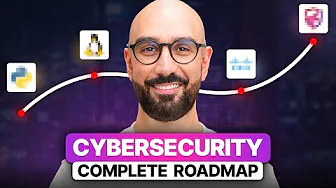
Breaking into cybersecurity can seem daunting, but with a structured approach and consistent effort, you can prepare yourself for an entry-level position in as little as 7-10 months. This comprehensive roadmap outlines the essential skills, certifications, and learning path to help you build a strong foundation for a successful cybersecurity career.
Building a Strong IT Foundation (1-2 Months)
Many aspiring cybersecurity professionals make the mistake of skipping this crucial first step. If you're new to the tech field or transitioning from another career, establishing a solid IT foundation is essential. Without understanding how computers and networks function at a basic level, you'll struggle to effectively secure or test them.
The CompTIA A+ certification is an excellent starting point, covering fundamental IT knowledge including:
- Installing and configuring operating systems
- Troubleshooting common PC issues
- Managing essential software
- Basic hardware components and their functions
- Network connectivity fundamentals
With 3-5 hours of daily study, you can master these foundational concepts in approximately 1-2 months. This knowledge forms the bedrock upon which you'll build more specialized cybersecurity skills.
Computer Networking Essentials (1-2 Months)
Whether your goal is to protect systems or identify vulnerabilities, understanding how data moves across networks is critical. Spend the next 1-2 months focusing on networking concepts such as:
- OSI and TCP/IP models
- Common protocols (HTTP, HTTPS, TCP, UDP)
- IP addressing and subnetting
- Routers, switches, and firewalls
- Network security fundamentals
For structured learning and validation of your networking skills, consider pursuing one of these certifications:
- CompTIA Network+ - An excellent entry-level certification covering vendor-neutral networking principles
- Cisco CCNA - More challenging but highly respected, focusing on Cisco networking technologies
While certifications enhance your resume, remember that employers value practical skills. Focus on understanding the concepts and gaining hands-on experience, not just memorizing for exams.
Operating System Knowledge (1-2 Months)
Cybersecurity professionals need a strong understanding of operating systems, particularly Windows and Linux. If you're just starting out, begin with the OS you're most familiar with (likely Windows) and learn:
- File permissions and access controls
- System and application logs
- User account management
- Security settings and configurations
- Command line operations
Long-term, you should become proficient in both Windows and Linux environments, as Linux is extremely common in servers, cloud environments, and security tools. While CompTIA Linux+ certification is available, it's not as crucial for career advancement as other certifications mentioned in this roadmap. Focus on practical knowledge rather than certification for this skill area.
Programming and Scripting Fundamentals (1-2 Months)
While you don't need to be a software engineer, basic programming skills are increasingly important in cybersecurity. Python is the recommended language for beginners due to its readability and widespread use in security tools and automation.

In addition to Python, familiarize yourself with:
- Bash scripting (for Linux environments)
- PowerShell (for Windows environments)
- Basic automation of repetitive tasks
- Script reading and modification
- Simple tool development
These scripting languages enable you to automate security tasks, analyze data more efficiently, and customize tools to your specific needs—all valuable skills for cybersecurity professionals.
Cybersecurity Fundamentals (1 Month)
With your technical foundation established, it's time to focus specifically on cybersecurity concepts. This stage introduces you to security principles, common threats, and protection methodologies.
Consider pursuing one of these certifications to formalize your knowledge:
- CompTIA Security+ - Widely recognized and often required for government cybersecurity positions
- Google Cybersecurity Professional Certificate - A newer but comprehensive program with a structured online learning approach
These programs will introduce you to key concepts including:
- Security principles and frameworks
- Risk management
- Threat identification and analysis
- Cryptography fundamentals
- Security policies and compliance
Defensive Security (Blue Team) Skills (1-2 Months)
Defensive security, often called "Blue Team" skills, focuses on protecting systems from attacks. This is a common entry point for many cybersecurity professionals and involves:
- Security monitoring and event analysis
- Log review and threat detection
- Incident response procedures
- Security tool implementation
- Vulnerability management
To formalize your defensive security knowledge, consider these certification options:
- Cisco Cyber Ops Associate - A well-respected certification from a major networking company
- Practical Security Analyst Assessment (PSAA) by TCM Security - Hands-on focused certification
- PTL1 by Security Blue Team - Specialized in real-world defensive tasks

Offensive Security (Red Team) Skills (1-2 Months)
Offensive security, or "Red Team" skills, involves testing systems for weaknesses by simulating real-world attacks. Even if you plan to focus on defensive security, understanding offensive techniques makes you more effective at defense.
Key skills to develop include:
- Network scanning and enumeration
- Vulnerability identification and exploitation
- Web application security testing
- Social engineering principles
- Post-exploitation techniques
Practice these skills in safe, legal environments like TryHackMe or HackTheBox, which provide virtual labs designed for ethical hacking practice.
Entry-level offensive security certifications include:
- eJPT (eLearnSecurity Junior Penetration Tester) - Hands-on entry-level red team certification
- PJP (Practical Junior Penetration Tester) from TCM Security - Beginner-friendly penetration testing certification
- CompTIA PenTest+ - Vendor-neutral penetration testing certification
Putting It All Together: Your 7-10 Month Roadmap
Following this structured approach and dedicating 3-5 hours daily to learning and practice, you can prepare yourself for an entry-level cybersecurity position in approximately 7-10 months. Here's a summary timeline:
- IT Foundations (CompTIA A+): 1-2 months
- Networking (Network+ or CCNA): 1-2 months
- Operating Systems (Windows/Linux): 1-2 months
- Programming/Scripting (Python, Bash/PowerShell): 1-2 months
- Cybersecurity Fundamentals (Security+ or Google Cybersecurity): 1 month
- Defensive Security (Blue Team): 1-2 months
- Offensive Security (Red Team): 1-2 months
Remember that learning speeds vary, and it's more important to thoroughly understand concepts than to rush through material. Focus on building practical skills alongside theoretical knowledge, as employers value hands-on experience.
Beyond Certifications: Building Your Cybersecurity Portfolio
While certifications provide a structured learning path and resume credentials, they're only part of what makes you attractive to employers. To stand out in the job market, consider:
- Creating a home lab to practice security concepts
- Participating in Capture The Flag (CTF) competitions
- Contributing to open-source security tools
- Documenting your learning journey through a blog or portfolio site
- Networking with security professionals through meetups and conferences
- Volunteering for security projects at non-profits or community organizations
These activities demonstrate your passion for the field and provide concrete examples of your skills that you can discuss during interviews.
Conclusion: Your Cybersecurity Journey
The cybersecurity field continues to experience tremendous growth, with demand for qualified professionals far exceeding supply. By following this roadmap and consistently investing time in skill development, you can position yourself for an entry-level role within a year.
Remember that cybersecurity is a field of continuous learning—even seasoned professionals must regularly update their skills. The roadmap provided here gives you a solid foundation, but your education will continue throughout your career as threats and technologies evolve.
With dedication, consistent practice, and a methodical approach to skill building, you can successfully transition into this rewarding and in-demand field. Good luck on your cybersecurity journey!
Let's Watch!
7-Month Cybersecurity Career Roadmap: Essential Skills for Landing Your First Job
Ready to enhance your neural network?
Access our quantum knowledge cores and upgrade your programming abilities.
Initialize Training Sequence